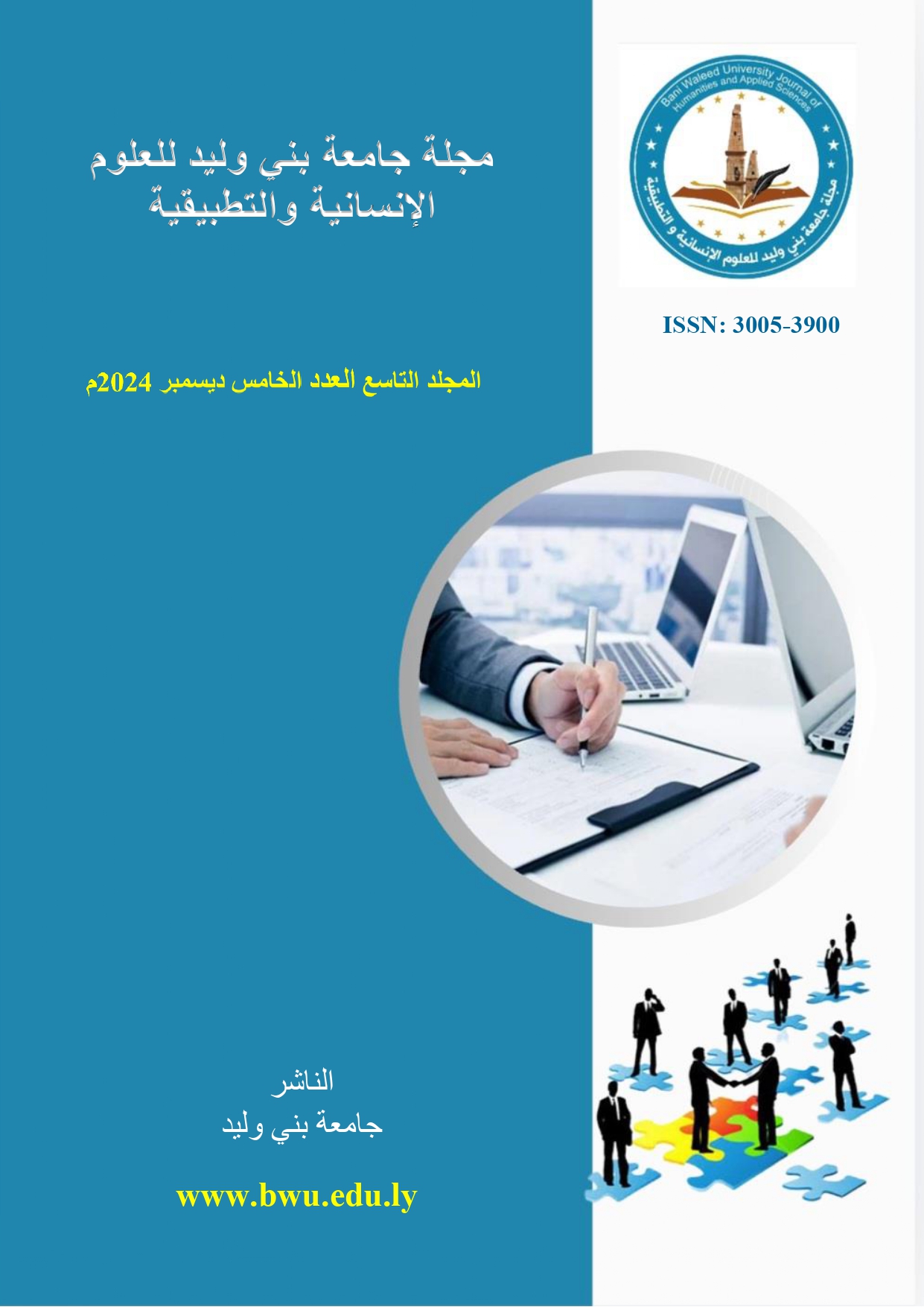Analysis of the effects of the Russian-Ukrainian war On the global economy
DOI:
https://doi.org/10.58916/jhas.v9i5.557Keywords:
economic growth, domestic product, recession, inflation, war, energy, foodstuffsAbstract
The research aimed to know the economic effects resulting from the Russian war on Ukraine, and to draw lessons from the results of the Russian war on Ukraine in the economic field. The research relied on both the inductive and deductive approaches, and the descriptive and historical approach was relied upon when reviewing the theoretical dimensions of the research. The research also used the method Analytical with regard to analyzing data on the Russian and Ukrainian economies and the global economy, as well as when analyzing the effects of the Russian-Ukrainian war on the global economy, through analyzing data issued by the competent authorities.
The research revealed the validity of the research hypothesis, as the Russian-Ukrainian war left negative effects on the Libyan, African, and global economies. The war in Ukraine already had repercussions on Libya’s import-dependent economy. Bread is a basic commodity, and the country imports more than 90% of its wheat, half of it from Ukraine and Russia, and the government subsidizes part of the wheat it imports. Since the outbreak of the conflict, wheat prices in local markets in Libya have risen significantly, forcing a number of bakeries to close. The global economy has also faced a number of challenges in light of the Russian war on Ukraine. It has declined. Global growth from 6% in 2021 to 3.2% in 2022, then 2.7% in 2023, due to the noticeable economic slowdown in the largest economies, as the United States’ gross domestic product contracted in the first half of 2022 and a contraction witnessed in the Eurozone in the first half of 2022. The second of 2022, and forecasts indicate that global inflation will rise from 4.7% in 2021 to 8.8% in 2022.
Downloads
References
• أولاً: المراجع العربية:
احصاء البنك الدولي، سنوات مختلفة.
آنا بيردي، الغزو الروسي لأوكرانيا يعوق تحقيق التعافي الاقتصادي بعد الجائحة في اقتصادات الأسواق الصاعدة في أوروبا وآسيا الوسطى، البنك الدولي، 4- 10-2022.
بوابة جريدة الأهرام المصرية، 2022.
تقرير البنك الدولي، 2022.
تقرير بلومبيرج، 3-7-2023.
تقرير صندوق النقد الدولي، 2022.
تقرير صندوق النقد الدولي، آفاق الاقتصاد الإقليمي، 23-2- 2023.
جهاد أزعور، الحرب في أوكرانيا وأصداؤها عبر مختلف مناطق العالم، تقرير صندوق النقد الدولي، 17-3-2022.
ديليب راثا، حرب في خضم جائحة. تاريخ الاسترداد، 26 نوفمبر 2022، علي: blogs.world /bank.org / ar/ hrb
رامي القليوبي،ما تريد معرفته عن الأزمة بين روسيا وأوكرانيا، 6 إبريل 2022، علي alaraby.co.uk/politics
شيماء تركان صالح، السياسة الخارجية الروسية حيال القضايا الدولية : انتشار النووي نموذجا، رسالة ماجستير في العلوم السياسية . (العراق: جامعة النهرين، علية العلوم السياسية، 2012).
صندوق النقد الدولي، مستجدات آفاق الاقتصاد العالمي، (واشنطن: صندوق النقد الدولي، يناير 2022.
عبد الخالق التهامي، موسم جاف بالمغرب وأزمة سياسية واقتصادية بتونس، المغرب، بالمعهد الوطني للإحصاء والاقتصاد التطبيقي، 2- 7-2023.
عماد حسن، كيف أثّرت حرب أوكرانيا على حياة الناس والاقتصادات العربية؟، مجلة سياسة، 23-2-2023
عمرو عدلي، دول شمال إفريقيا الأكثر تضرراً، معهد كارنيجي، 24-6- 2023.
عبد العزيز علي علي، آثار الحرب الروسية الأوكرانية علي الاقتصاد العالمي، مركز السياسات، 13-4-2022.
فريد بلحاج، ضغوط متفاقمة: الحرب في أوكرانيا و تداعياتها على منطقة الشرق الأوسط وشمال افريقيا، 7 إبريل من مدونات البنك الدولي: blogs.worldbank.org/ar/arabvoices/compounded/stress-impact_war
اللجنة الاقتصادية لإفريقيا التابعة للأمم المتحدة: https://www.un.org/africarenewal/section
مجلس السفر والسياحة العالمي (WTTC): www.wttc.org
محمد السبيطلي، التداعيات الاقتصادية والسياسية للحرب الروسية الأوكرانية في إفريقيا، مركز الملك فيصل للبحوث والدراسات الإسلامية، مارس، 2022.
محمد المنشاوي، ما مدى تأثير حرب روسيا وأوكرانيا على الاقتصاد العالمي؟، الجزيرة نت، 22-3-2022.
محمد علي الخوري، الحرب الروسية: الأوكرانية وتأثيراتها على الدول العربية، أبو ظبي، الاتحاد العربي للاقتصاد الرقمي، 2022.
محمد نور البصراتي. استراتجية العقوبات الدولية و انعكاساتها على سياسات الدول ( العراق-ايران-روسيا) نموذجا. مجلة كلية الاقتصاد و العلوم السياسية ، يولية 2022، المجلد 3، عدد23.
منال هاني، الحرب الروسية على أوكرانيا وأثرها على الاقتصاد العالمي: الواقع والدروس المستفادة، جامعة محمد خيضر، بسكرة، الجزائر، مجلة معهد العلوم الاقصادية، المجلد 25، عدد 2، 2022.
منظمة الأمم المتحدة للأغذية والزراعة (الفاو): http://www.fao.org
مؤتمر الأمم المتحدة للتجارة والتنمية: https://unctad.org/en/Pages/.aspx
مؤتمر الأمم المتحدة للتجارة والتنمية: https://unctad.org/en/Pages/.aspx
موقع الحدث، 2022.
موقع المعرفة، 2922.
موقع الميادين، 2022.
موقع الميادين، 2022.
موقع عرب بوست، 2022.
ندي سليمان هندي، أثر العامل الاقتصادي في صناعة القرار السياس ي في روسيا، رسالة دكتوراة (سوريا: جامعة دمشق، 2017).
وسن احسان عبد المنعم، الترتيبات الاقليمية الجديدة والتغيرات في ميزان القوى العالمي: تكتل دول البريكس نموذجاً، مجلة مركز دراسات الكوفة 58، 2020.
وكالة الأنباء الكويتية، 2022.
ثانياً: المراجع الأجنبية:
ACY Securities MENA, ACY Securities provides access to CFDs on the Forex, Index, Shares, ETFs & Commodity markets with transparent pricing, 26-5-2023.
Afreximbank, http://www.Afreximbank.com .
International Energy Agency, www.iea.org.
International Monetary Fund: Are Macro and Credit Policies Enough?, (Washington DC, IMF, 2022)
OECD ilibrary, 2022.
The Institute of International Finance http://www.iif.com/research/data.
The Institute of International Finance http://www.iif.com/research/data.
The Institute of International Finance http://www.iif.com/research/data.
The World Bank: Emerging Risks to the Recovery, (Washington DC, World Bank, 2022).
The World Bank: Emerging Risks to the Recovery, (Washington DC, World Bank, 2022).
The World Bank: the Global Economic Prospects, the Global Economic Outlook: a Changed World, 2022.
UN Comtrade Database.
World Trade Organization, www.wto.org.













